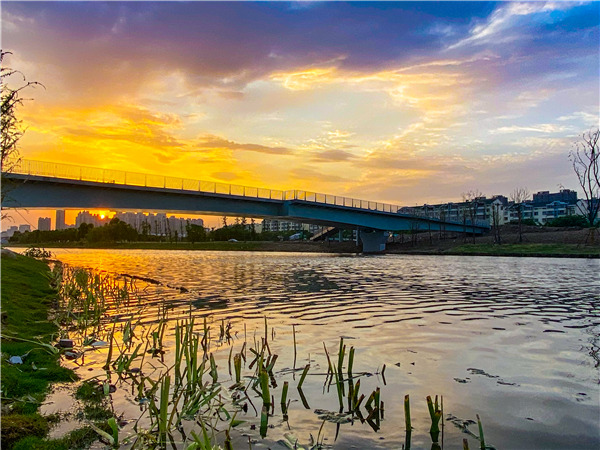
Bodu River, with a total length of 24.1 kilometers, has a history of 3,200 years. [Photo provided to wuxinews.com.cn]
Rehearsals are now under way for "The Beginning of the River" (河之始兮), a classic dance drama performed by the Wuxi Song and Dance Troupe.
This is not the first time the group has taken on a historical production, but it is the first time its producers have tried to incorporate the Grand Canal.
"When I heard about this topic for the first time, I felt it was a profound concept. The canal has been important through most of Wuxi's history, and for the economic development of the Jiangnan area," said the director Tang Chenglong.
Wuxi's history with waterways dates back to 3,000 years ago, when Taibo, the eldest son of King Tai of Zhou, dug the first artificial canal in Chinese history – the Bodu River.
Measuring 24.1 kilometers in length, the Bodu River has a history of 3,200 years, in which its fate and the history of Wu culture are closely intertwined.
Mao Jianping, director of the Taibo Cultural Protection Institute in Wuxi's Xinwu district, explained that Taibo was born in what is now Northwest China's Gansu province. The locals back then had very different mannerisms and attire from those of the central kingdom, sporting tattoos and disheveled hair.
"The Wu people wore their hair short to fish in the river, and their tattoos were a form of deterrent to scare away water snakes. The Wu people depended on fishing and hunting for their livelihood," Mao said.
"It is said that after Taibo established the Wu Kingdom, he vigorously developed water conservation measures and developed agriculture production. The Bodu River, the first artificial canal in Jiangnan, was built during that time," he added.
Taibo traveled thousands of miles to dig the river so that it could transport soldiers and irrigate farms in Wuxi's suburbs.
The Bodu River is now a branch of the Grand Canal that stretches from Beijing to Hangzhou. It is also considered the most important river in Wuxi. The Grand Canal was built 1,400 years ago and is a main water transportation route through the city. The section of the canal in Wuxi, which is about 40 meters wide and 40 kilometers long, connects the Yangtze River in the north with Taihu Lake in the south.
More than 100 small canals have been built around the main canal in the past 1,000 years as the city gradually transitioned from an agricultural production base to an industrial center.
Many experts from Wuxi Grand Canal Cultural Belt Construction Research Institute agree that the Grand Canal has helped to shape the local culture, lifestyles and economy in Wuxi.